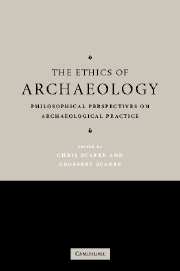Book contents
- Frontmatter
- Contents
- List of contributors
- Acknowledgements
- 1 Introduction
- PART I THE OWNERSHIP OF CULTURAL OBJECTS
- PART II ARCHAEOLOGISTS AND THE LIVING
- 6 Human subjects review and archaeology: a view from Indian country
- 7 Trust and archaeological practice: towards a framework of Virtue Ethics
- 8 Truthfulness and ‘inclusion’ in archaeology
- 9 Ethics and Native American reburials: a philosopher's view of two decades of NAGPRA
- 10 Stewardship gone astray? Ethics and the SAA
- PART III ARCHAEOLOGISTS AND THE DEAD
- PART IV THE COMMON HERITAGE OF HUMANKIND?
- References
- Index
10 - Stewardship gone astray? Ethics and the SAA
Published online by Cambridge University Press: 05 June 2012
- Frontmatter
- Contents
- List of contributors
- Acknowledgements
- 1 Introduction
- PART I THE OWNERSHIP OF CULTURAL OBJECTS
- PART II ARCHAEOLOGISTS AND THE LIVING
- 6 Human subjects review and archaeology: a view from Indian country
- 7 Trust and archaeological practice: towards a framework of Virtue Ethics
- 8 Truthfulness and ‘inclusion’ in archaeology
- 9 Ethics and Native American reburials: a philosopher's view of two decades of NAGPRA
- 10 Stewardship gone astray? Ethics and the SAA
- PART III ARCHAEOLOGISTS AND THE DEAD
- PART IV THE COMMON HERITAGE OF HUMANKIND?
- References
- Index
Summary
After much deliberation and debate, the Society for American Archaeology (the SAA) has ‘strongly’ endorsed ‘Principles of Archaeological Ethics’. It ‘urges’ archaeologists to use these principles in establishing the responsibilities they have to archaeological resources, to those who have an interest in these resources and to those affected by archaeological work (SAA 2004; SAA Ethics in Archaeology Committee 2000).
In this paper, we discuss the implications the SAA principles have for the treatment of archaeological artefacts other than skeletal remains. We have excluded the latter from our discussion for a number of reasons: because skeletal remains raise complex issues that warrant extended discussion on their own; because these issues are investigated in other contributions to this volume; and because we have examined these issues in another context (see Groarke 2001).
According to the set of principles the SAA proposes, the basic principle of archaeological ethics is the following principle of stewardship:
The archaeological record, that is, in situ archaeological material and sites, archaeological collections, records, and reports, is irreplaceable. It is the responsibility of all archaeologists to work for the long-term conservation and protection of the archaeological record by practicing and promoting stewardship of the archaeological record. Stewards are both caretakers of and advocates for the archaeological record for the benefit of all people; as they investigate and interpret the record, they should use the specialized knowledge they gain to promote public understanding and support for its long-term preservation.
(SAA Ethics in Archaeology Committee 2000: 11)- Type
- Chapter
- Information
- The Ethics of ArchaeologyPhilosophical Perspectives on Archaeological Practice, pp. 163 - 178Publisher: Cambridge University PressPrint publication year: 2006
- 17
- Cited by

